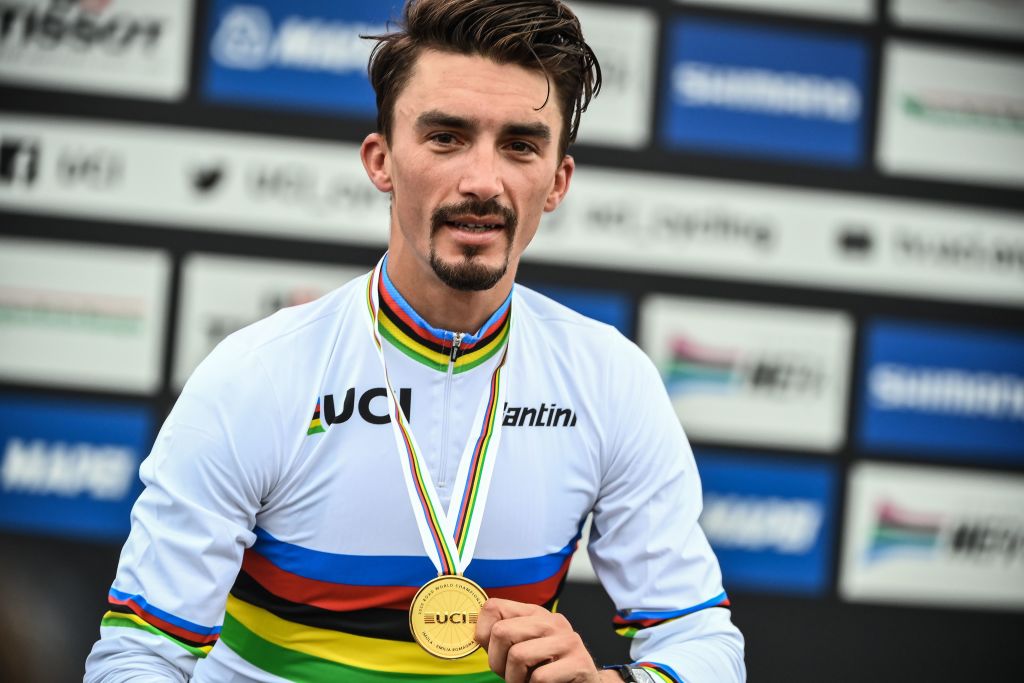Julian Alaphilippe reaches the summit at the World Championships
Frenchman finds rainbow after 'a year of highs and lows'

“C’est le sommet,” Julian Alaphilippe said softly as he glanced down at the rainbow bands across his chest. If World Championships victory marks the summit of his career, then his triumph on the Imola course was all about the summit of Cima Gallisterna.
A little over 11 kilometres separated that point from the finish, but Alaphilippe had to get there alone, or at least without the favourite Wout van Aert. He knew from experience that the Belgian would likely have proved unbeatable in a sprint on the Autodromo Enzo e Dino Ferrari. At Milan-San Remo last month, Alaphilippe couldn’t quite shake him loose on the Poggio and duly lost their duel on the Via Roma.
As the front group hit the steepest portion of the Gallisterna, Alaphilippe glanced behind and saw Van Aert clamped tightly to his wheel. He climbed from the saddle in a bid to force some separation, accelerating fiercely past Michal Kwiatkowski (Poland). When he looked around again, he saw that Van Aert’s clasp had loosened. He kicked once more, and the gap opened accordingly.
“When I saw Wout was there on the last climb, I made the maximum effort all the way to the top because, for me, he was the biggest threat,” Alaphilippe said. “It was a long way from there to the finish.”
After his victory in Nice on the second day of the Tour de France, Alaphilippe could never again seem to gain purchase on his accelerations. There was perspiration aplenty but none of the inspiration that garlanded his remarkable displays of 2019. On the most important day of his season, however, Alaphilippe conjured up a performance that bore comparisons with his remarkable solo win at Épernay on last year’s Tour.
A lead of 8 seconds at the summit doubled to 16 with 7 kilometres to go. Five of the strongest cyclists on the planet – Van Aert, Kwiatkowski, Marc Hirschi (Switzerland), Primož Roglič (Slovenia) and Jakob Fuglsang (Denmark) – combined to give a committed chase, but they couldn’t draw back so much as an inch on Alaphilippe, who freewheeled across the line with 25 seconds in hand.
“It’s the race of my dreams,” Alaphilippe said. “Every time you win a big race, it’s different and special emotion, but the rainbow jersey is something else, it’s hard to describe. It’s the race that made me dream the most. It’s hard to explain the feelings I have. I’ve realised the dream of my career.”
The latest race content, interviews, features, reviews and expert buying guides, direct to your inbox!
His eyes moist with tears, Alaphilippe looked to the sky as he stood on the podium during the playing of La Marseillaise. As in Nice, his thoughts were for his late father Jo, who died in late June.
“In life, everybody has difficult moments. You have to find the strength to go on, to get up after you take blows. I’ve always had that strength in me to continue and that helped me today,” Alaphilippe later.
“On days like today, I think of the people close to me, the work of my team, the loss of my father. This has been a strange year.”
Tour de France
Alaphilippe bridged a 23-year gap by becoming France’s first world champion since Laurent Brochard in 1997 and, inevitably, he was asked if he now aimed to become the home nation’s first Tour winner since Bernard Hinault in 1985. For two dizzying weeks last summer, Alaphilippe looked increasingly poised to end that drought in the most surprising of circumstances, only to lose yellow two days of shy of Paris. He insisted, however, that he has no immediate aspirations to target overall victory at the Tour.
“Not for the moment. It’s not something I’ve placed as an objective for my career, at least in the short term,” Alaphilippe said. “In the last few years, I’ve made an objective of the Worlds. It’s special to have achieved that. The objective of winning the Tour de France isn’t something that’s in my head for the moment. It’s going to take a while to realise the jersey I have on my shoulders right now.”
When Alaphilippe took yellow early in this year’s Tour, it briefly looked as though he might mount another impromptu GC challenge, but he lost the lead to a time penalty three days later and swiftly receded from the upper reaches of the standings in the Pyrenees. Come the third week, his Tour seemed to double as a training camp for the Worlds.
“After my Tour last year, it was really different for me to ride it this year. To be honest, I was really happy to win in Nice because I hadn’t won yet this year,” he said. “After that, I tried to do my best for the team, but I was always focused on the Worlds. Today the dream came true.”
Alaphilippe will wear the rainbow bands in competition for the first time at Flèche Wallonne on Wednesday before he tackles Liège-Bastogne-Liège, Amstel Gold Race and the Tour of Flanders on successive weekends. “It’s going to be a discovery for me, the main goal is to discover it and enjoy it,” he said of his Ronde debut, though on Sunday evening, Alaphilippe had eyes only for rainbows, not the charcoal grey skies of the Flemish Ardennes.
“I don’t see this victory as a kind of revenge,” he said. “It’s just an emotion that does me good after a year of highs and lows.”

Barry Ryan was Head of Features at Cyclingnews. He has covered professional cycling since 2010, reporting from the Tour de France, Giro d’Italia and events from Argentina to Japan. His writing has appeared in The Independent, Procycling and Cycling Plus. He is the author of The Ascent: Sean Kelly, Stephen Roche and the Rise of Irish Cycling’s Golden Generation, published by Gill Books.